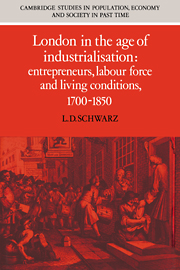Book contents
- Frontmatter
- Contents
- List of figures
- List of tables
- Acknowledgements
- List of abbreviations
- Introduction
- Part I Wealth and occupations in London
- Part II Fluctuations and mortality in the metropolis
- Part III The standard of living and the London trades
- Conclusion: downstream from industrialisation
- Appendices
- 1 Seventeenth– and eighteenth–century sources on occupations and incomes
- 2 Occupations insured with Sun Fire Office and Royal Exchange Assurance, 1775–87
- 3 1851 census: Armstrong classification
- 4 1851 census: summary tables
- Bibliography
- Index
- Cambridge Studies in Population, Economy and Society in Past Time
1 - Seventeenth– and eighteenth–century sources on occupations and incomes
Published online by Cambridge University Press: 11 September 2009
- Frontmatter
- Contents
- List of figures
- List of tables
- Acknowledgements
- List of abbreviations
- Introduction
- Part I Wealth and occupations in London
- Part II Fluctuations and mortality in the metropolis
- Part III The standard of living and the London trades
- Conclusion: downstream from industrialisation
- Appendices
- 1 Seventeenth– and eighteenth–century sources on occupations and incomes
- 2 Occupations insured with Sun Fire Office and Royal Exchange Assurance, 1775–87
- 3 1851 census: Armstrong classification
- 4 1851 census: summary tables
- Bibliography
- Index
- Cambridge Studies in Population, Economy and Society in Past Time
Summary
Seventeenth-century data
Two historians have recently sought to analyse occupations in London during the late seventeenth century: Beier, who has carried out an extensive survey of the occupations entered in burial registers between 1641 and 1700, and Alexander, who has analysed the occupations entered in the City for the poll tax of 1692. Neither of them was primarily concerned with providing a systematic basis for comparison with later periods, and the greater the effort that one undertakes to make such a comparison the more one is impelled to question its validity. In the first place, occupations changed their nature –retailing in particular was in the process of becoming a much more specialised occupation – and the distinction between production and retailing, which is not always valid even in 1851, is not at all valid two centuries previously. Secondly, a large town, such as London, combining so many functions, not dominated by any single activity or source of income, will produce a highly variegated pattern of employment, whether examined for the seventeenth or the nineteenth centuries. When even the largest occupations occupy only a relatively small proportion of the labour force (with the obvious exception of domestic service for women), a comparison of figures different by one or two percentage points across a gap of a century and a half has a very doubtful significance.
- Type
- Chapter
- Information
- London in the Age of IndustrialisationEntrepreneurs, Labour Force and Living Conditions, 1700–1850, pp. 241 - 249Publisher: Cambridge University PressPrint publication year: 1992



